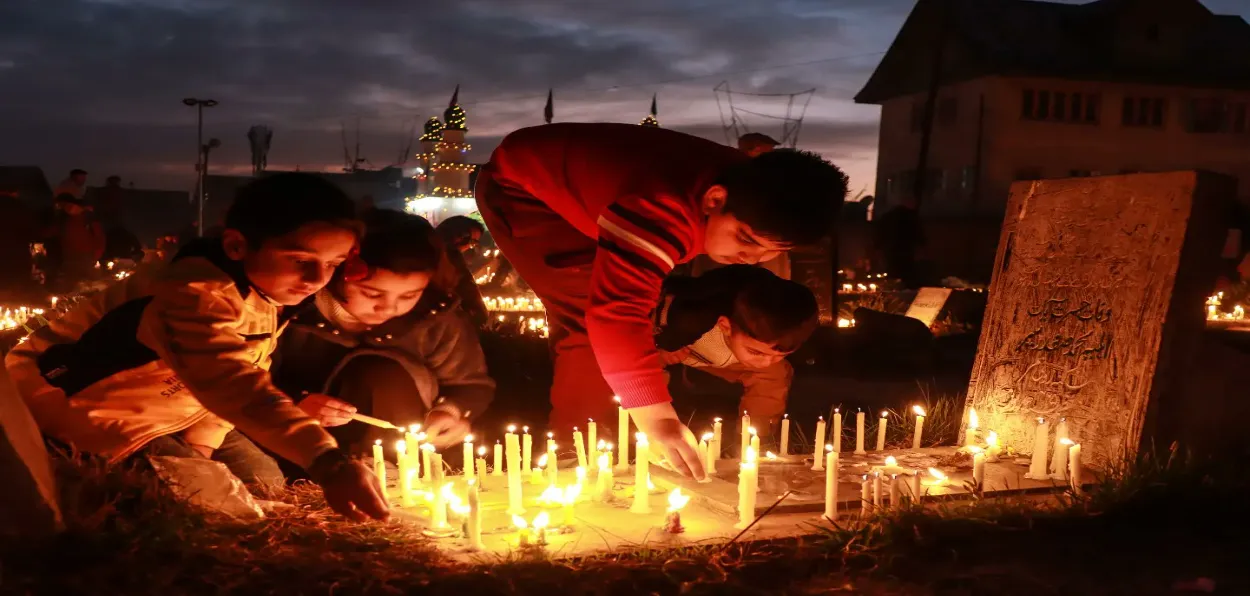
Shagufta Nemat
In Islam, there are only two main festivals of Muslims. Eid and Bakrid. However, Indian Muslims celebrate many other festivals that do not have importance in their religion but are mandated by their Indian heritage.
Shab-e-Barat is one such festival. In large parts of India, Muslims celebrate it just like Diwali. They clean their houses, illuminate their homes and other spaces, and pray all through the night. It’s akin to Diwali when people believe that Goddess Lakshmi will visit their house at night and will fulfill the wishes of the devotees.
Muslims who worship on the night of Shab-e-Barat has a similar feeling. The followers of Islam believe that Allah accepts their sincere prayers on this night. He pardons sins. Some people also visit the graves of their forefathers before the Fajr Namaz and remember the deceased by praying and lighting candles at their graves.
Shab-e-Barat is celebrated in Shaban, the 8th month of the Hijri (Islamic) calendar. There is nothing special about this in Islam and Quran. It is an Islamic belief that decisions about the whole year are made on this night.
Decisions are made about who will co
me into the world, who will leave the world, who will get what, who will lose what, etc. are taken on this night by the Almighty.
In such a situation, every Muslim wants to pray for the whole night and ask Allah for something 'special' for him and his loved ones. There is a belief that in this month the Arabs went out in search of water and the Hurmat tribe came joined the war in this month after being imprisoned in their homes for months.
Srinagar-based videographer Basit Zargar shared a video of a Srinagar graveyard on Twitter:
People lighting candles to remember dear ones at their graves on the occasion of Shab-e-Baraat in Srinagar, Kashmir, tonight.
— Ahmed Ali Fayyaz (@ahmedalifayyaz) March 7, 2023
Video: @basiitzargar pic.twitter.com/GOBp3Kj1H8
Shab-e-Barat is made up of Shab and Barat. Shab stands for the night and Barat means 'to be acquitted' or “to get freedom and” to get rid of one's evils. According to the Islamic calendar, this night starts once a year after sunset on the 14th day of Sha'ban.
On this night all the Muslims of the world worship Allah; they pray at night; repent of their sins and make a promise to Allah to get rid of their vices. There is a belief that all the sins of those who worship in Shab-e-Barat are forgiven. The confession of the sin is to be followed by a pledge to correct their behaviour and thoughts or else Allah will not forgive them.
One group of Muslims believes that prayers should be said all night and that entails remaining awake. The other class does not give much importance to staying awake at night.
Some Muslims have the custom of making and distributing halwa and other Indian desserts. However, one section of Muslims also opposes it. In other words, the class of Muslims who have a deep impression of Indian culture, have no hesitation in preparing good dishes, distributing them, and doing Niyaz-Fatiha.
It is not wrong to cook good food and distribute it among the poor. But those who see Islam in the light of Hadith and the Quran do not believe in this. This class even says that if halwa or good dishes have to be fed to the poor, then why for one day, why not for the whole year?
However, those who celebrate Shab-e-Barat as a festival argue that why help the poor in the name of Fitra only in Ramazan or give charity in the name of Zakat? Why not do this every day?
Looking at Shab-e-Barat from the point of view of 'Sahih Hadith', this night has its importance. In this, the birth and death of a human being are decided in Heaven.
All the decisions are taken on the same night. Angels are handed over their registers and orders. It has come out from the quoting of Sahabis (followers of Prophet Muhammad) that on this night we should make special prayer to Allah for the fulfillment of our wishes.
Also, after giving up sleep this night, one makes a deal for a good life after death. That is, by repenting sins, one purifies one’s soul in such a way that after death there is not much adverse registered in the heavenly accounts. Muslims believe that heaven ad hell will be decided after death only after accounting for their deeds.
There is no evidence of any special worship on the night of Shab-e-Barat. Except that Prophet Muhammad used to fast in this month with more effort than he did in any other month. When he was asked about this, he said that this is the month when the deeds of his servants will appear before Allah. I wish that I should be fasting when my deeds are presented before my Lord.
ALSO READ: Fatima Sheikh's joining Savitribai laid the foundation of women's education in India
A balance between the mundane and divine is the core of Islamic teachings. That is, we cannot find God by worshiping only. To attain God, it is necessary to perform one's duties as well. The religion of humanity has to be followed. Relatives, neighbours, locality, society, and the country, everyone has to be benefited from one’s deeds.
Only then we can get rid of all our sins and join the efforts of changing the world with vigour and enthusiasm. Otherwise, nothing is going to come to our hands even after staying awake for many nights.
If we are true believers of Prophet Mohammad, then we should also try to fast as much as possible in this month and avoid all those things which were disliked by the Prophet. Otherwise, we will earn less virtue and become more involved in sin.
(The author is a Delhi-based teacher))
